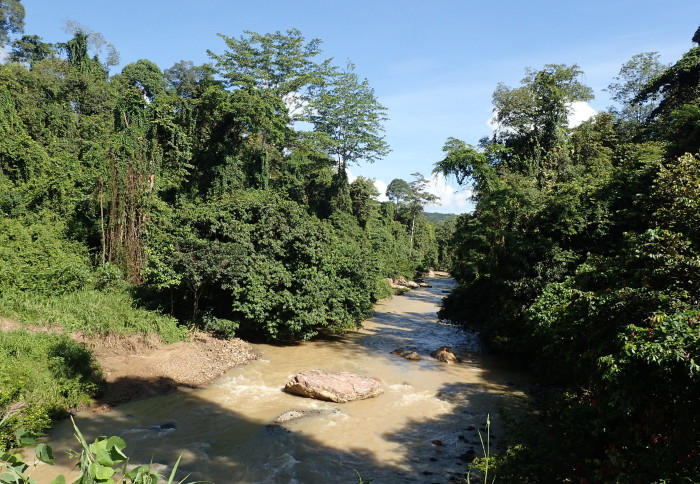Deforestation squeezes top predators in forest streams

Streams in areas converted to oil palm have different top predators to those flowing through intact forests, affecting stream food webs.
Logging and deforestation are known to affect biodiversity and species richness, but a new study shows how these may create trouble for local ecosystems by affecting the food chain length.
Ecosystems like streams provide valuable ‘ecosystem services’, such as provision of fresh water and food and flood prevention, which could be diminished if food chains are altered and the ecosystem fails to function as normal.
Our study shows that losses of species richness can affect food chains... These changes could have knock-on effects for the functioning of the ecosystem. Dr Clare Wilkinson
A team of researchers led by Imperial College London and the National University of Singapore studied 19 streams in Borneo, in an area with a variety of land uses – primary forest, partially logged areas and full conversion to oil palm plantation – known as the Stability of Altered Forest Ecosystems (SAFE) Project. Their study is published today in the journal Ecology.
They found that top predators were disproportionally affected by deforestation, with fewer predator links in the food chain in oil palm plantation streams. The researchers found that this was caused by a change in the type of predators.
More specialised, endemic predators, such as the barb (Hampala sabana) were replaced by ‘generalists’, predators such as the non-native snakehead (Channa striata) that can eat a wider diet, such as fish, frogs and invertebrates.
Knock-on effects
Lead researcher Dr Clare Wilkinson, from the University Singapore and formerly of Imperial College London, said: “We know deforestation and land-use changes can affect the local species, but are often unsure what knock-on impacts these changes can have.

“Our study shows that losses of species richness can affect food chains, and in particular their length – how many species there are between the primary producers of nutrients at the bottom of the food chain and the top predators. These changes could have knock-on effects for the functioning of the ecosystem.”
The team measured carbon and nitrogen in streams and more than 3,000 captured fish, which allowed them to track the sources of nutrients and how these moved through the food chain.
Carbon isotopes – versions of carbon – can reveal where the basic nutrients in an ecosystem come from, either from the stream (by photosynthesising organisms like algae) or from the surrounding environments (such as through leaves and soil entering a stream).
Deforestation could affect both of these sources, as the reduction of forest cover could increase the temperature and sunshine of the water but reduce the amount of material entering a stream.
Preventing further impacts
However, the team found no difference in the amount of carbon from in-stream sources, and no effect of changes in environmental sources of carbon, suggesting these ecosystems rely more on in-stream sources that remain relatively stable.
The changes in nitrogen, however, revealed that top predators were strongly affected by land-use changes, with different predators found in streams in oil palm plantations.
SAFE Director of Science Professor Rob Ewers, from the Department of Life Sciences at Imperial, said: “The change in ecosystem structure and the loss of specialised species could have knock-on effect on the health of the ecosystem.
“We now need to do more research to follow the consequences of these changes, and develop strategies that reverse, mitigate, or prevent further impacts.”
-
‘Forest conversion to oil palm compresses food chain length in tropical streams’ by Clare L. Wilkinson, Kenny W J Chua, Roswitha Fiala, Jia Huan Liew, Victoria Kemp, Arman Hadi Fikri, Robert M Ewers, Pavel Kratina and Darren C J Yeo is published in Ecology.
Article supporters
Article text (excluding photos or graphics) © Imperial College London.
Photos and graphics subject to third party copyright used with permission or © Imperial College London.
Reporter
Hayley Dunning
Communications Division